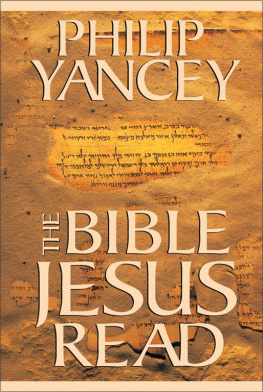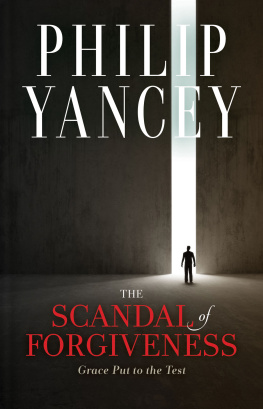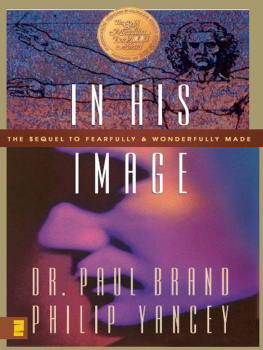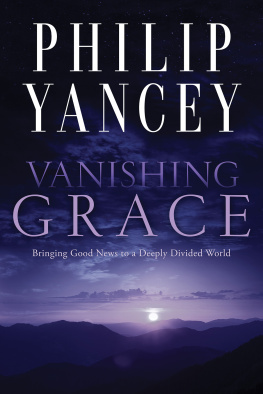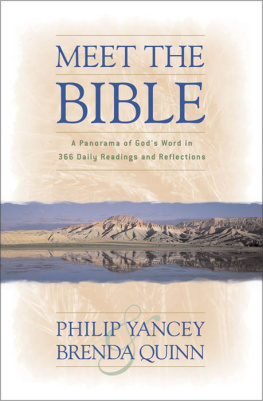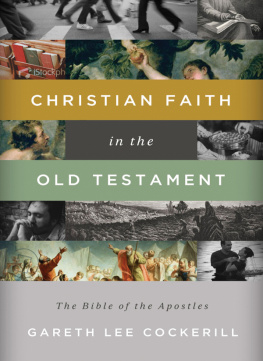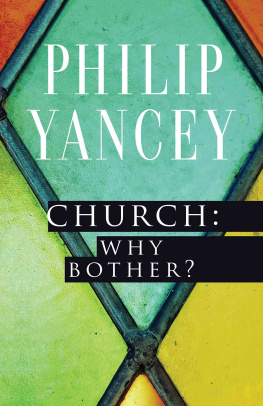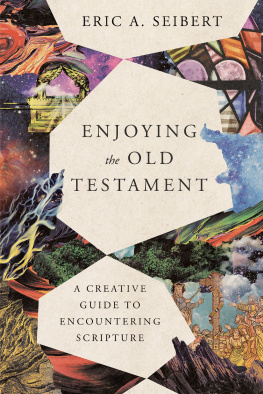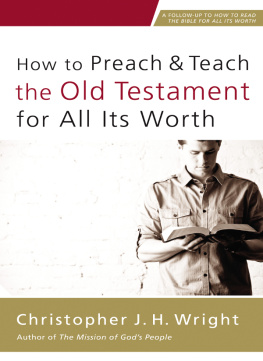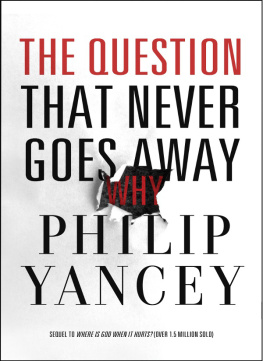To Buck Hatch, who first opened up to me the delights and mysteries of the Old Testament
I feel a need to apologize for what you will not find in this book. Though I am writing about the Old Testament, the Bible Jesus read, I feel neither qualified nor inclined to delve into such matters as author, date of composition, and the insights of literary or form criticism. I read the Bible as any ordinary reader does, interacting with the content, trying to understand the authors original intent. Because I make my living as a writer, I also peek behind the curtain to speculate why the author used a certain illustration, chose an unusual metaphor, or started here and not there.
After a chapter introducing the Old Testament as a whole, I have chosen a sampling from each of its major sections: history, prophets, poetry, and wisdom literature. Why these particular books? Oswald Chambers once said that the Psalms teach you how to pray; Job teaches you how to suffer; the Song of Solomon teaches you how to love; Proverbs teaches you how to live; and Ecclesiastes teaches you how to enjoy. I wish I had such sunny confidence in what I expect from the Bible! Im afraid I made my selectionsJob, Deuteronomy, Psalms, Ecclesiastes, Prophetsout of my own doubts and struggles, not because I expect these books to teach me the secrets of life. I find in these particular books companions for my pilgrimage. In them, I discover myselfand for this reason I have written about them personally and subjectively, not analytically.
I begin with Job because I have spent so much time in my own writing exploring Jobs questions. Many scholars believe it to be the oldest recorded story in the Bible, a brilliant drama pre-dating even Abraham. Job strips a relationship with God to its bare essentials: one man alone, naked, having it out with his God. In a pattern that recurs throughout the Old Testament, God stacks the odds against himself in favor of human freedom, and the very fact that the Bible includes Job, with its powerful arguments against Gods injustice, underscores that pattern.
Deuteronomy I chose because I love its tone of melancholy realism. While the rest of the Hebrews were itching to cross a river and enter the Promised Land, old man Moses took the time to reflect on the hard lessons they had learned and the harder ones they would soon face. The fact that we now use crossing the Jordan as an image of spiritual triumph shows that we have not yet absorbed the central message of this remarkable book. I wrote a different version of this chapter for a book to accompany the Dreamworks animation film The Prince of Egypt, which portrays the story of Moses and the Exodus. (In a few instances I followed their plot line, and added fictionalized detail to the biblical account.) Jewish readers of my manuscript were scandalized. Why this pessimism, this fatalism, this latent anti-Semitism in a work celebrating the grand miracle of the Exodus? In the margin beside some of the strongest passages a Jewish proofreader wrote, Where is this from!? I pointed out that each questionable quotation came directly from Deuteronomy, part of the sacred Torah.
I have always struggled to get past the baffling inconsistencies of the Psalms, and the best way I know to struggle is to write about whatever is bothering me. In the process, Psalms has moved from my list of least favorite books to most favorite. In its chorus of voices, we hear every intonation of what getting along with God might involve.
How in the world did Ecclesiastes make it into the Bible? I have often wondered that, especially in periods when I identify so closely with the cynical viewpoint of its worldly author. And as for the Prophets, since childhood I have been in recovery from the homiletical abuse of those mysterious books. I write about them because I want to understand them.
With some regret, I will avoid discussing many of the difficulties and stumbling blocks people encounter in the Old Testament. For example, it contains some six hundred passages of explicit violence, many of them linked directly to God himself. How do we reconcile that with the nonviolence preached by Gods Son Jesus? I am tempted to drop everything and deal with these issues, but that would make for a very different book. This is not a book of argument or apology, rather, one of self-discovery. Besides, many authors far more qualified have taken up these issues in great detail.
Still, I must make two observations. First, I find the Old Testament to be, above all, realistic. When I view a play like Macbeth or King Lear, or a movie like The Godfather or Saving Private Ryan, I encounter a world of evil, violence, and revenge. I feel moved by those experiences because I recognize my world, violent in the playgrounds of Chicago as well as on the battlefields of Europe and Asia. Kids shoot each other at school, terrorists blow up airplanes and buildings, cops pound on handcuffed prisoners.
The Old Testament portrays the world as it is, no holds barred. In its pages you will find passionate stories of love and hate, blood-chilling stories of rape and dismemberment, matter-of-fact accounts of trafficking in slaves, honest tales of the high honor and cruel treachery of war. Nothing is neat and orderly. Spoiled brats like Solomon and Samson get supernatural gifts; a truly good man like Job gets catastrophe. As you encounter these disturbances, you may recoil against them or turn away from a God who had any part in them. The wonderful quality of the Old Testament is that it contains those very responses as well! God anticipates our objections and includes them in his sacred writing.
Kathleen Norris gives a healthy perspective on this issue in her book Amazing Grace.
Many people these days feel an absence in their lives, expressed as an acute desire for something more, a spiritual home, a community of faith. But when they try to read the Bible they end up throwing it across the room. To me, this seems encouraging, a good place to start, a sign of real engagement with the God who is revealed in Scripture. Others find it easy to dismiss the Bible out of hand, as negative, vengeful, violent. I can only hope that they are rejecting the violence-as-entertainment of movies and television on the same grounds, and that they say a prayer every time they pick up a daily newspaper or turn on CNN. In the context of real life, the Bible seems refreshingly whole, an honest reflection on humanity in relation to the sacred and the profane. I cant learn enough about it, but I also have to trust what little I know, and proceed, in faith, to seek God there.
Second, I detect in the Old Testament a gradual but certain movement toward grace. The Hebrews lived in wild, barbaric times. Their laws, which may seem harsh to us, represent a great softening compared to their neighbors laws. They established basic rules of warfare and enshrined in their laws respect for the poor and care for the environment. They set limits on revenge and built Cities of Refuge. We must remember, as we look back on a time of blood-vengeance, slavery, polygamy, and contract marriage with a brothers wife, that God had to work with peoples moral condition at its given stage. In the writings from this period lay the seed, but only the seed, of Gods grace. These are the Scriptures that testify about me, Jesus told the Torah-readers of his day, then added pointedly, yet you refuse to come to me to have life.
As nurses commonly do with infants, God is wont in a measure to lisp when speaking to us, said John Calvin. In the Old Testament especially, God lisped. Speaking in language that could be understood, God gradually edged his people toward a different way. He took the side of the oppressed and promised a Suffering Servant who would redeem not as the perpetrator but as the victim of violence. For a time he allowed behavior that he disapproved of, because your hearts were hard. Meanwhile, albeit sometimes in zigzag fashion, the long vectors of history pointed steadily toward his Son, Jesus, the final revelation of God in human form. In Jesus, God no longer lisped; the Word spoke loud and clear.
Next page
